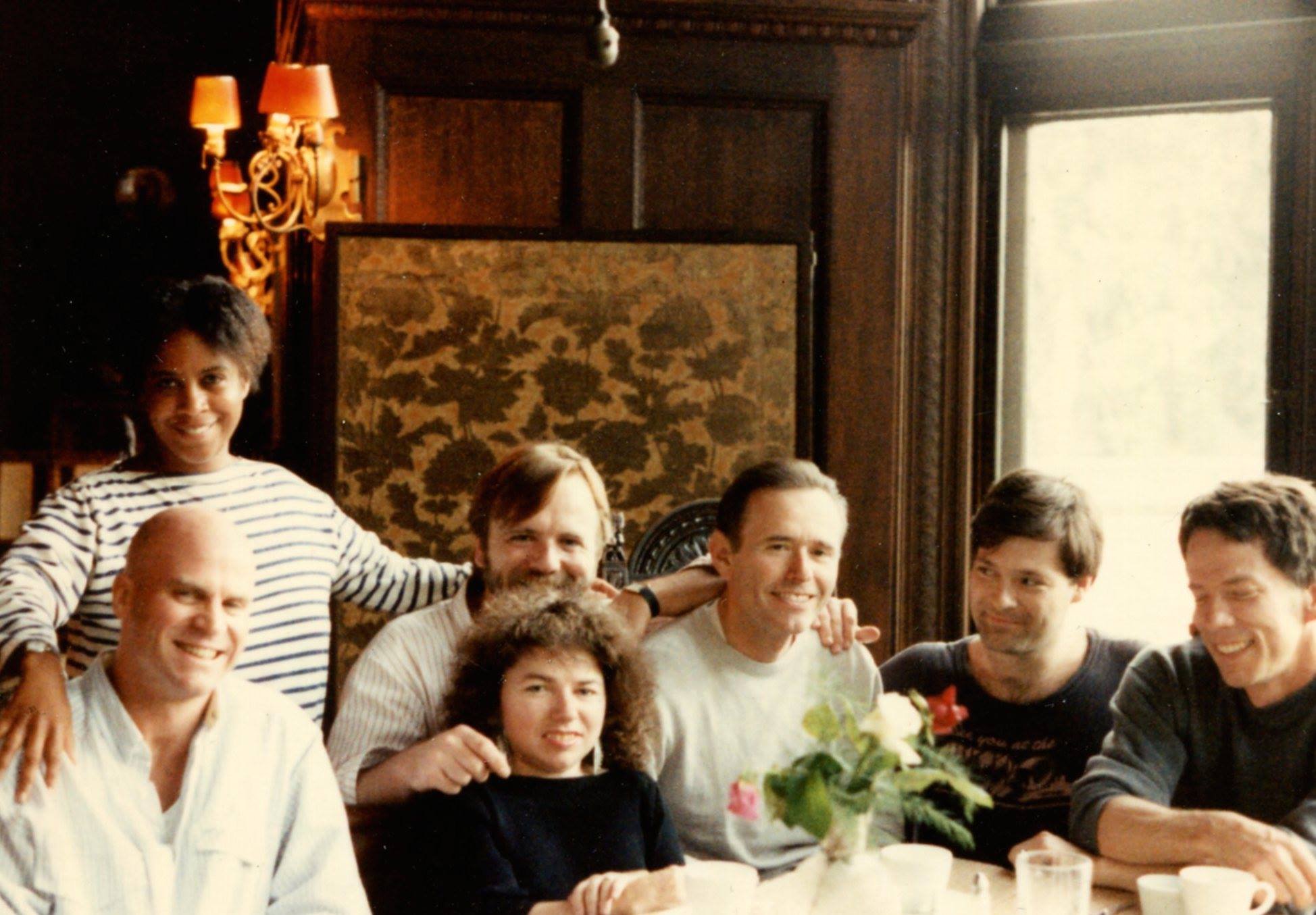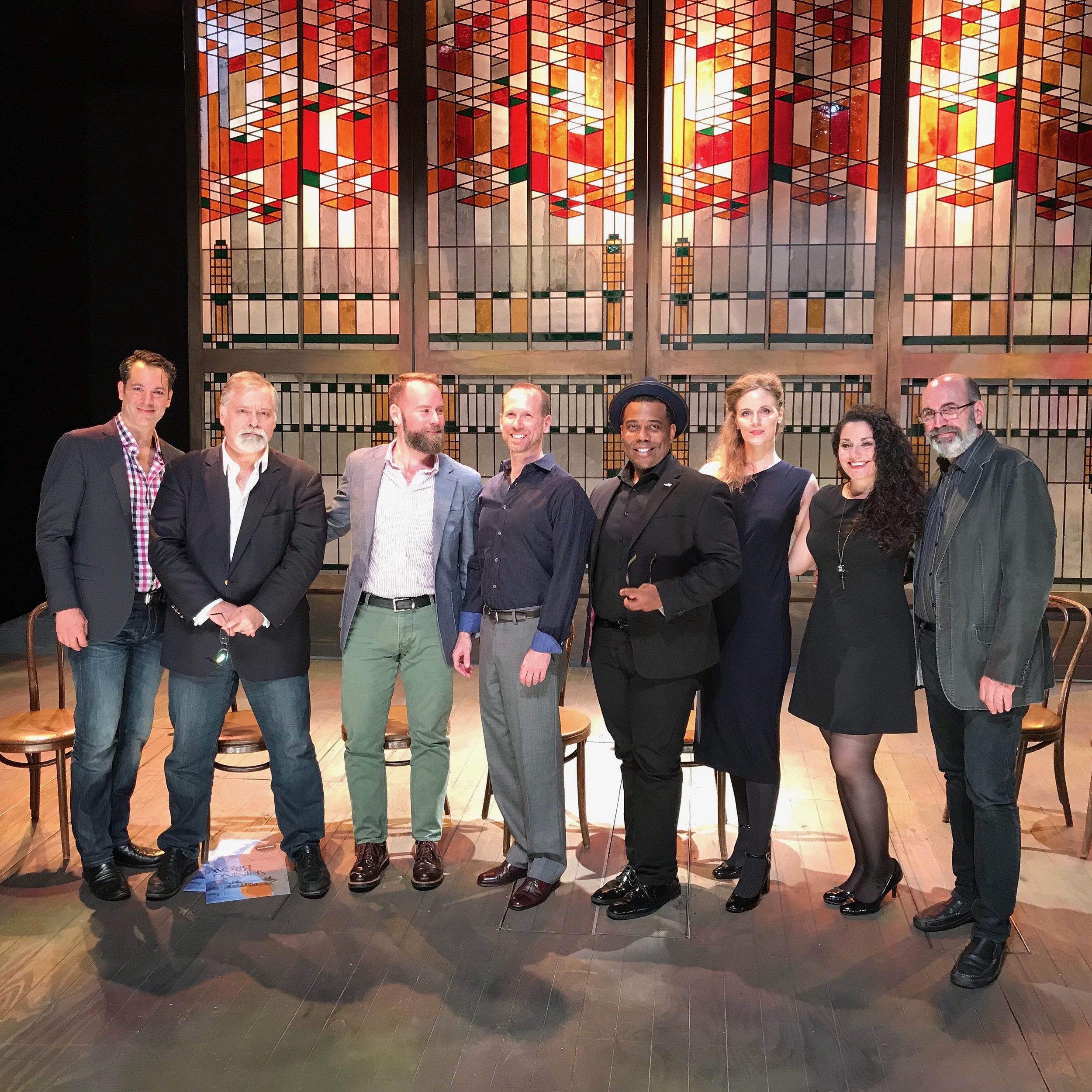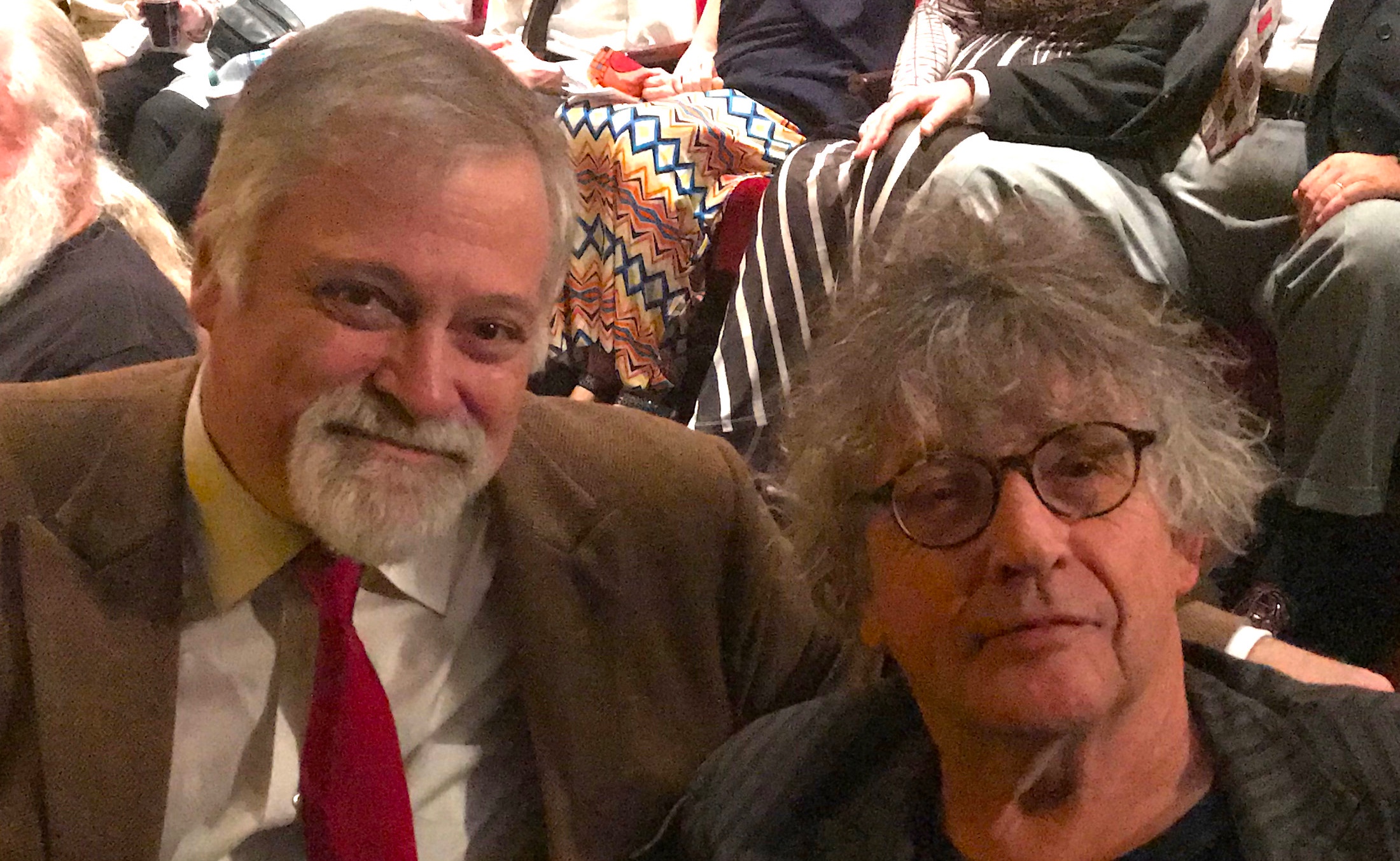It was always time with David. He bent it; he warped it; he turned it around back on itself; he lived outside of it; he could practically stop it with music; in life, he ran with it until he ran out of it.
The day in March 2019 that my memoir was published and offered up to the crickets I put all my handwritten diaries—over thirty years’ worth of scribbling—into banker’s boxes and sealed them up. I traded the false specificity of reportage for the even more subjective truth of memory. Now I must pour, as Ned Rorem and his teacher Virgil Thomson used to, through the index of my book to fix events in time. I recall reading the words that I wrote about David to him over the telephone and asking whether he thought they were okay before sending off the manuscript. (He did.)
So, on this March 2024 morning I tried to find my letters to David (and his to me) and discovered that I’d have to move two portable air conditioners, a box fan, and two suitcases to get to the file drawer in the storage closet in which letters from all the D’s in my life ended up so I gave up. They’re in there—all the postcards with Mad Hatters and March Hares stamped on them, words jumping off the page limned in multiple colors (he always had a glass or peanut butter jar filled with different colored pens and pencils on his desk at whatever artist colony or home he was working) with little, crazy asides added in at the last moment. Anyone who received a letter from David knew they could expect an illuminated manuscript of sorts. He took time to write them. They were vibrant, gossipy, funny, and sweet. His communications were always labor-intensive; details mattered: sometimes a sentence would march on in blue ink and end with a single bright red exclamation point.
Since I no longer particularly trust my own memory, I paged through my “Work Log and List of Themes,” a notebook I’ve kept since July 1976 (and which, ominously, is entirely filled up, with no more blank pages to accommodate new work—a nightmare scenario for someone as superstitious and obsessive as me), to determine which artist colonies (and when) David and I had had overlapping residencies over the years (since I always finished something and made note of where I was when I finished it) to fix some dates in advance of a chat with his biographer the other day. So, the chronology of this Mad March through Time is underpinned by the several vignettes that I included in my memoir and the (many more) exactly-dated marginalia (“Sang through this with DDT in the music room,” or “Bowings revised per DDT,” and the like.) from my “Work Log.”
David and Daron publicizing the New York Philharmonic premiere of Daron’s Common Ground as part of the 1990 Horizons Festival, Lincoln Center, NYC 27 July 1990. p/c: The New York Times
The central pillar of our relationship was our shared love of Yaddo, the storied artist retreat in Saratoga Springs, New York, at which we met during June 1984. I was between studies at Curtis and Juilliard, footloose, fueled by an entirely impractical sense that it was my time. While being shown around the place by painter Nancy Brett, who was serving that summer as a Special Assistant to the President, I was led into the mansion’s Great Hall to the sound of a Mendelssohn “Song Without Words” wafting out of the spacious music room. I had arrived just before dinner and David, as was his custom, was relaxing by running his fingers through the piano repertoire for the pleasure of our, as he announced when Nancy introduced us, “fellow inmates.” That infectious, unforgettable smile! The mischievous grin. A sparkle in his eyes second only to Otto Luening’s. Nancy left us, and David, reaching for a well-worn edition of Haydn symphonies reduced to four hands, asked archly whether I wanted to be on the bottom or the top.
I was, as so many other musicians were, enchanted. I took the left side, hoping that hitting an occasional bass note properly might keep me in the game, and we were off. After a few minutes, I realized that he was gradually speeding up and that his left hand was dropping down between mine and adding bits of my right-hand part that I was leaving out to (let’s face it) survive. It was an exhilarating, joyous display of raw talent. My heart began racing. For a few more minutes I survived on adrenaline until, suddenly, he simply began playing everything up a step. That was it: I was thrown from the horse. He’d exceeded my keyboard skills and, laughing so hard that I teared up, I got up and told him that I had to unpack. “Welcome to Yaddo,” he said, laughing.
Former president of PEN, poet and author Richard McCann, filmmaker Sharon Greytak, painter Michael Flanagan, David and this young composer immediately became constant dinner companions. Over the years, David, Richard, and I remained close friends, and served for decades together on the board of Yaddo. It turned into quite an important summer for me, as I also met poet Gardner McFall, who graciously allowed me to set her poem, “Sonnet After Oscar Wilde,” which I sang immediately upon completion, with David accompanying. Twenty-three years later, Gardner, who was also by then a board member, bravely mined her own life story when she wrote the libretto of our opera Amelia for Seattle Opera.
The Tower Studio at Yaddo, where David Del Tredici often worked. p/c: Daron Hagen
David and I overlapped several times during the 80s at the Virginia Center for the Creative Arts and MacDowell—always the four hands, me sight-reading through whatever song he was working on and ending up laughing with joy; him sightreading whatever song I was writing and me singing them. “Why do we have to write for singers?” he would ask, “We know they can sing it beautifully; but isn’t it more fun to hear someone who can’t sing perform it?” (I couldn’t help but notice that the thought had come to him after accompanying me.) In 1990, David was serving as composer-in-residence for the New York Philharmonic, and, although he never took credit, likely made possible my music’s debut with the Philharmonic—a piece called Common Ground, which had recently been awarded the Kennedy Center Friedheim Prize.
When David went away on sabbatical during the 90s I’d teach for him at City University of New York. Composition lessons, of course; but also counterpoint and orchestration. I was also on the faculty of Bard College at the time (and for a couple of semesters, the Curtis Institute), and he enjoyed, I think, the fact that I, like him, didn’t consider myself an academic. “Teaching gives me physical pain, doesn’t it you?” he once asked as we packed his station wagon—he off to another colony, and me back to the Upper West Side and a semester of filling in for him. He was only partly serious. David could be a superb teacher. And when he went to artist colonies he—like me—always worked like a dog. We’d run into one another raiding the refrigerator either very, very late or very, very early—the only two “inmates” still awake and working and ask one another how it was going. “I can’t tell you or it will turn to shit,” I would say. And he would say, “I know. Hide the erasers.” If there was cheesecake or dessert of any sort to be had, we’d finish it together. Always, the next day, I’d be jogging it off; David would be pumping iron at the local gym. I sent him five or six of my students when it was their time to move on over the years and don’t regret it.
Time together at the keyboard was something he shared with lots of other musicians, and I am sorry if I give the impression I was the only one who enjoyed the privilege. I loved him for the force of nature that was his talent, the grace with which he carried it, and the super-hard work that he did, year after year, to honor it. He modelled a working composer to me more than Ned or Virgil because he kept revising and improving everything. Like everyone who knew him, I am devasted by the irony that a man who exulted in the lifelong physicalizing of his music at the keyboard became afflicted with Parkinson’s Disease.
During a visit to Sag Harbor in the mid 90s, I recall him playing the entirety of his opera Dum Dee Tweedle and experiencing more keenly than ever how his obsessive use of melodic and harmonic sequences (either telescoping them to run faster through diminution, or more slowly through extension or metric modulation) skewed one’s perception of time. My memory’s a little foggy, but I think that when he finished, I felt as though he had been playing for about forty minutes only to look at my watch to see that 90 had elapsed. Repetition was talismanic for him as a composer, I think; it could summon emotional lightness or darkness. If tonality was redemptive to him, then his compositional apotheosis came through such a profound compression of harmonic and melodic movement that it felt dissonant—Liszt on steroids.
DDT 80th Birthday Concert, Joe’s Pub, New York, NY March 2017. p/c: Tevi Eber
By the late 90s, we were performing fundraisers together for Yaddo—he would be paired with the extraordinary, luminous John Kelly; I’d pair off with Paul Sperry, or whomever was singing in whatever opera I was working on. I recall an event at Harold Reed’s, for example, where he performed his Acrostic Song (literally all over the keyboard) and I followed by accompanying myself in some simple, tender settings of Paul Muldoon’s poetry. “How can you be so simple?” he asked. “That terrifies me.”
When Muldoon and I underwent the premiere of our opera Bandanna in Austin in April 2000, David wept afterwards, told me that he knew what it had taken to summon so much darkness in the final scene. “Of course, nobody is going to get it,” he said. I was astonished when he said, “Tonight, you are my hero.” Stephen Sondheim is said to have decreed that, on opening night, one should simply note that a work is “brilliant” to the author. “Criticism later,” he is supposed to have said. I agree. I was touched that David stood by his assessment of Bandanna. I recall—listening together to the entirety of my latest opera, A Woman in Morocco at his apartment in Westbeth—David pointing out exact measures that I had forwarded musical arguments begun in Bandanna fifteen years before. “Diminished seventh chords are very dangerous because they can go anywhere,” he observed. “Yeah, either they can go Salome or Salome at the Super 8 Motel,” I replied, which made him giggle.
One of my treasures remains the fragment of manuscript that he gave me after a particularly athletic read-through of a song in 2002-ish that he subsequently dedicated to me called "Now You Know" during which I had broken down, laughing with tears of joy & disbelief. I think that he wrote "pre-Hagen sketch” on it because I told him that he was absolutely nuts to ask a singer to do something. Over dinner: "Do you DARE to accept the dedication of this song?" he asked. It is my ardent hope that he didn't change a thing on my account.
I began to sense time beginning to run out on us as early as July 2005, when Gardner and I were at Yaddo working on Amelia and David accompanied me in the music room where we first met as I sang our first, trial aria to see how it landed with the other guests. In the aria, a father pictures himself as looking down on his loved ones from the stars after his demise. By the time the aria had been folded into the opera and premiered, my first son had been born. Came along another, and a move from Manhattan to the country. David and I saw one another less frequently. He still went to concerts—what a champ! But I had stopped. They didn’t feed my work the way that they did his. Ours became primarily a relationship of letters and telephone calls.
Still, Gilda Lyons and I would catch up with David every year at Yaddo’s annual meeting. Lord, how David loved Gilda, and how deeply they intuitively understood one another. We performed a version of David’s Acrostic Song together for him on a concert in Gilda’s Phoenix Concerts series in New York (alongside the world premiere of “Emily’s Aria” from Ned’s Our Town) that I had confected and he observed, with mock horror, “Now that you have had your way with my music, shall we continue to speak?” “Was it okay?” I asked. “It was wonderful, but why did you reharmonize me?” “Because I could,” I replied. The twinkle.
At the premiere of David Del Tredici’s “Herrick’s Oratorio” in New York City, 20 May 2023. p/c: Tevi Eber
I am still having trouble coming to terms with the fact that David is not down in the Village, pulling reams of notes out of his piano at Westbeth, or making little forts with walls comprised of different sorts of jelly jars and vitamin bottles at the breakfast table at Yaddo, or jogging in the woods at MacDowell, or lurking by the driers at VCCA in the wee hours looking for leftovers in the fellows’ refrigerator. When Cantori premiered his Herrick Oratorio in May 2023, it was a chance to say goodbye. David, a Catholic, ever the subversive, had woven Martin Luther’s Mighty Fortress into the finale of what was effectively his final public statement. I had driven in from the country for the premiere and was shocked, but not surprised, by the toll that Parkinson’s had extracted. As ever, his talent dazzled, and I told him so. “You’re up to your old tricks, messing with my sense of time,” I said. He had been, but the path we had traveled together, our shared Mad March, was running out. Nothing between us had changed, but everything around us had. He pulled me in close and said that he loved me and that I should take care of myself and Gilda and the boys. The twinkle was still there.
If I had not been walking out of the church with a friend I would have had to have stopped to steady myself, because, for the first time since hearing David play Mendelssohn before meeting him in June 1984, I felt that David’s time had run out. I was gutted. It wasn’t until an hour later, driving up the Palisades to the country, that I was able to reconnect to the fact that I am blessed to actually have some more time in front of me, with skinned knees and tree forts having given way to basketball and girlfriends for my sons, and mid-career engaging Gilda. Music remembers absolutely everything, I thought, and it has its own relationship with time. Messiaen knew it; David lived it. To me, a talent like David’s is evidence of the Unseen. And now it is time for me to learn how to let David go. Because there are among us many more forces of nature like him who can use a hand: some of them are very young not just in spirit, but in fact. Help them; lift them up, I thought, the way that the simple fact that talent like David’s existed lifted me. I’ll close with that.











